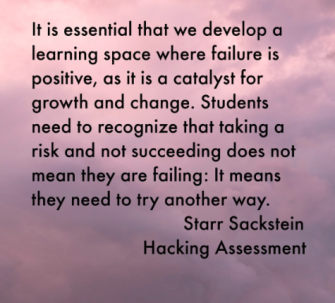
You’ve done the research. You may have even tried it out in one of your classes for a unit or more. You’ve reflected and realized that it isn’t just shifting practice, it’s a whole philosophical shift that you’re ready to make because you know it will benefit kids.
Now it’s time to start a new year fresh without grades or at least some version of a standards based classroom that strays from traditional beliefs about how grades communicate learning and you want to make sure you do it right.
Here are some tips for setting up a no-grades or standards based classroom:
- Draft a letter to send home to families about how the assessing practices. What you’re doing is going to be different than what others in your school are doing (unless you’re fortunate enough to be in a place where the whole school is moving in that direction.) and it will definitely be different than what they know. In this letter, highlight the benefits of the shift: better, more precise feedback and communication about specific skills and content knowledge, less focus on the punitive and competitive nature of grades, a mastery approach that allows students to make mistakes, embrace them, grow from them and reflect as well as determine the pace that best works for them. Also include contact information so that any questions are welcomed and addressed. A short video explaining the shift can also be helpful.
- Be prepared to talk about these changes on back to school night - be open and keep your guard down while you answer questions. Parents are going to have legitimate concerns not because they don’t trust you but because they have never experienced this before.
- Have a conversation with students in the first five days about what grades mean to them and what learning looks like. Really listen. Stay open and then help them understand a class without grades is one that supports their growth as learners. It isn’t about getting a higher grade, but learning more or developing mastery in different areas.
- Build reflection into the learning process as early as possible and help students understand that this is where the real learning will be expressed. Teach it explicitly and then provide really excellent feedback, taking what they say into how you teach as quickly as possible.
- Remember to keep standards at the front of expectations. Front load them. Show them to kids and help them understand them right away. Keep it simple and compact wherever possible and always remember to connect it to their lives.
- Slow down. There is no rush to get it all in, so make sure the students get the concept before you start moving into the assessment. Answer their questions and make sure their concerns are addressed. Try not to get frustrated when they don’t get it right away, especially if you are working with older students.
- Build immediate feedback into the culture of the classroom immediate. Feedback from students to you, students to each other and you to the students. Learning lives in the feedback, so you want students to feel safe receiving it and asking questions.
- Consistently model the expectations by alway discussing standards and offering feedback. Be explicit when you do it. Mention them by name and remind them how this is more detailed and effective than grading.
- If you are using an online grade book for secondary students, make sure you adjust what that looks like so that students can see their progress and it can help them talk about learning.
Shifting this mindset about grades is a challenging one. Don’t give up if it doesn’t go well right away. Be ready to do the dance and redirect students, parents and colleagues as needed.
What are your biggest concerns about going gradeless in this new school year? Please share